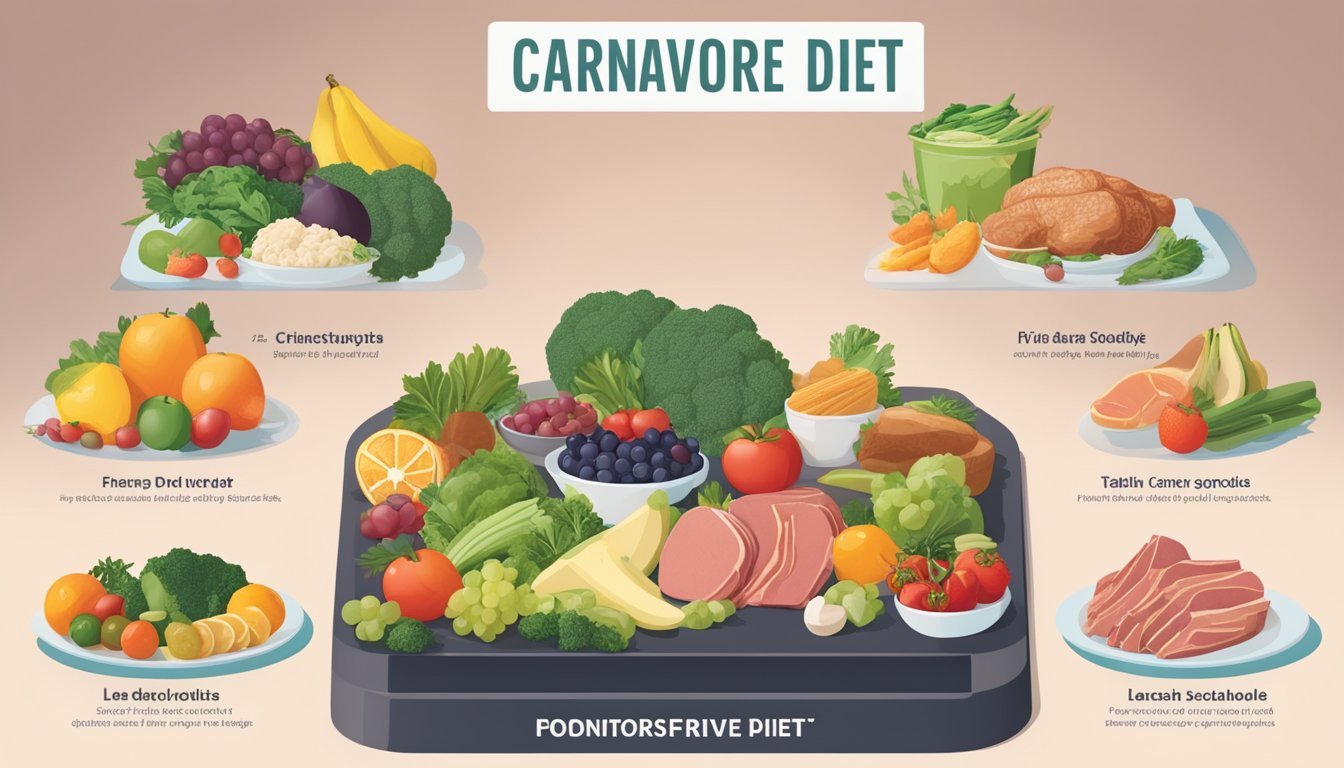Carnivore Diet vs. The 17 Day Diet
Comparative Analysis of Phased Eating Strategies
The Carnivore Diet and The 17 Day Diet offer contrasting philosophies on nutrition and weight loss, each with its own unique approach to eating. The Carnivore Diet is an all-meat regimen that emphasizes consuming animal products exclusively, positing that a diet similar to what our Paleolithic ancestors might have eaten is suitable for modern-day health. Advocates suggest it may lead to mental clarity, weight loss, and relief from some health issues, as it eliminates plant-based foods entirely.
The 17 Day Diet, by contrast, is structured around four distinct phases, each lasting 17 days, designed to promote weight loss and prevent plateaus. This phased approach gradually alters nutritional intake to include a variety of food types, focusing on lean proteins, probiotics, and complex carbohydrates. It is aimed at improving digestive health and metabolism, offering a more traditional, balanced palette of nutrients.
Comparing these diets highlights the evolving landscape of nutritional strategies, where one approach may focus on a historical perspective of eating while another embraces a cyclical pattern for overall wellness. Both garner attention and support, but the suitability of either diet depends largely on individual health goals, dietary preferences, and medical considerations.
Understanding the Carnivore Diet
The Carnivore Diet is characterized by its exclusive consumption of animal products and the elimination of plant-based foods, focusing on a high intake of protein and fat.
Fundamental Principles
The Carnivore Diet operates on the premise that human digestive systems are optimized for eating animal flesh and products. Its proponents argue that reducing or eliminating plant-based foods can lead to improvements in various health markers.
Primary Aspect: Consumption of only animal-based products
Elimination: No plant-based foods, including fruits, vegetables, grains, nuts, and seeds
Variation: Some proponents allow dairy and eggs, while others adhere to strictly meat and water
Primary Foods and Restrictions
Meat: Beef, pork, chicken, lamb, etc.
Fish and seafood
Eggs
High-fat dairy products (for some individuals)
Foods avoided:
All types of fruits and vegetables
Grains and legumes
Nuts and seeds
Any source of carbohydrates and fiber
Potential Health Benefits
Advocates of the Carnivore Diet suggest several potential health benefits, often attributed to the ketogenic aspect of the diet where the body utilizes fats instead of carbohydrates as a primary energy source.
Weight Loss: May aid in obesity reduction due to high satiety levels from protein and fats.
Reduced Inflammation: Animal foods can lead to lower levels of inflammation for some individuals.
Simplicity: Fewer food choices can simplify meal planning.
Possible Risks and Criticisms
The diet, while potentially beneficial for some, carries risks and has faced criticism from nutritionists and health professionals.
Nutrient Deficiencies: The absence of plant-based foods may lead to deficiencies in fiber, vitamins, and minerals.
Cholesterol and Heart Health: High intake of animal fat and protein could affect cholesterol levels adversely, posing a risk to heart health.
Sustainability: Questions about the long-term sustainability and environmental impact of the diet exist.
The Carnivore Diet's stark deviation from conventional dietary guidelines and its focus on animal products elicits both intrigue and skepticism, warranting careful consideration and potentially medical supervision.
Exploring the 17 Day Diet
The 17 Day Diet incorporates a phased approach to weight loss and nutrition, providing structured meal plans and guidelines. Each phase aims to promote healthy eating habits and metabolic improvements.
Phases and Flexibility
The 17 Day Diet unfolds in four distinct phases, each with its own focus and duration. Cycle 1, called "Accelerate," restricts carbohydrates to stimulate weight loss and cleanse. Cycle 2, "Activate," alternates low and high-calorie days to improve fat burning. Cycle 3, "Achieve," introduces additional foods and aims to develop good eating habits. The final stage, Cycle 4, "Arrive," serves as a maintenance phase with more dietary flexibility during weekends.
Dietary Composition
Throughout its cycles, the diet emphasizes a balanced intake of protein, vegetables, and fruits, with alterations in carbohydrate consumption to kick-start metabolism. Designed to provide a variety of nutrients, the 17 Day Diet gradually adapts to include more complex carbohydrates and nutrition-dense foods while maintaining a focus on portion control and frequent meals.
Protein: Lean proteins are a staple to preserve muscle mass.
Vegetables: Non-starchy vegetables provide fiber and vitamins.
Fruits: Limited to low-sugar options, especially during the initial phases.
Health and Weight Loss Benefits
The diet claims to promote weight loss through its calorie modulation and high nutrient content, which can also have positive effects on blood sugar levels, potentially benefiting those with pre-diabetes or diabetes. Advocates cite improvements in metabolism and the potential reduction of cardiovascular disease risks through improved dietary patterns.
Critiques and Considerations
Critics point out that rapid weight loss during the initial phase may not be sustainable long-term. The adjustment of carbohydrate intake could pose challenges for people accustomed to higher carb diets. Dieticians advise individual assessment, considering that nutritional needs vary and one's health benefits might not universally apply.
Comparing Carnivore and 17 Day Diets
The Carnivore and 17 Day Diets present distinct approaches to weight management and health impact with varying levels of dietary restrictions and implications for long-term lifestyle fit.
Weight Management
Carnivore Diet: A diet high in protein and fats, giving priority to meat, fish, and other animal products. It limits carbohydrate intake, which may lead to ketosis, possibly aiding in weight loss.
Pros: May lead to rapid weight loss due to lower carb intake.
Cons: Lacks long-term studies on its efficacy and sustainability.
17 Day Diet: Cycles through different amounts of carbs, proteins, and fats in four phases to prevent plateaus and stimulate weight loss.
Pros: Designed to avoid metabolic slowdown by changing the dietary routine every 17 days.
Cons: Frequent dietary changes may be difficult for some to maintain.
Health Impact
Carnivore Diet:
Pros: Can reduce blood sugar levels as it is very low in carbs.
Cons: Potential risk for nutrient deficiencies and heart disease due to lack of fiber and plant-based nutrients.
17 Day Diet:
Pros: Phases incorporate a variety of nutrients and may be more balanced.
Cons: The rapid shifts in diet focus may affect consistent nutrient intake.
Dietary Restrictions and Freedom
Carnivore Diet:
Restrictions: Zero plant-based foods; eliminates all sources of carbohydrates and fiber.
Freedom: Allows unrestricted consumption of meats, which can simplify meal planning for some.
17 Day Diet:
Restrictions: Tighter control on types and amounts of food depending on the phase.
Freedom: Greater dietary variety across all food groups, including carbs during certain phases.
Maintenance and Lifestyle Fit
Carnivore Diet: Might be challenging for long-term adherence due to its restrictive nature but may fit those looking for a simple, low-carb option.
17 Day Diet: Offers more flexibility and variety, which can be conducive to a sustainable lifestyle change, though the phased approach requires careful attention to food choices and timing.
Targeting Specific Health Goals
When examining the Carnivore Diet and the 17 Day Diet, it’s important to notice how each diet is structured to meet specific health goals such as keto adaptation, managing diabetes and blood pressure, as well as improving gut health and inflammation.
Keto Adaptation and Benefits
The Carnivore Diet is essentially a zero-carb plan that promotes keto adaptation, where the body shifts from using glucose to fatty acids and ketone bodies for energy. This state can lead to weight loss and may increase mental clarity and energy levels. In contrast, the 17 Day Diet, with its phased approach, cycles in and out of lower and higher carb periods, which may not consistently keep the body in ketosis.
Carnivore Diet: High-protein and high-fat intake; consistently maintains ketosis.
17 Day Diet: Cycles through low-carb phases; intermittent keto adaptation.
Managing Diabetes and Blood Pressure
For people with type 2 diabetes, both diets can result in improved blood sugar control due to lower carbohydrate intake. The Carnivore Diet’s emphasis on meat and animal products can support a low-carb lifestyle, potentially beneficial for managing diabetes. The 17 Day Diet’s phasic approach also aims to reduce carbs but includes more variety, which may be more sustainable for some individuals.
Blood Sugar Control: Reduced carb intake common to both diets aids in managing diabetes.
Blood Pressure: Both diets can lead to weight loss, which can, in turn, lower high blood pressure.
Improving Gut Health and Inflammation
Both the Carnivore Diet and the 17 Day Diet may influence gut health and inflammation differently due to the types of foods consumed. A high-protein, meat-based diet might reduce inflammation for some people by eliminating plant-based foods that they cannot tolerate. Conversely, the 17 Day Diet's inclusion of various food groups in different phases might promote a more diverse gut microbiota, which can be beneficial for gut health.
Gut Health: Diversity in the diet (17 Day Diet) vs. elimination of potential irritants (Carnivore Diet).
Inflammation: Both diets may reduce inflammation through the exclusion of processed foods and sugars.
Nutritional Considerations
When comparing the Carnivore Diet and The 17 Day Diet, one must carefully evaluate the nutritional profiles of each. They must consider the balance of macro and micronutrients, the potential need for supplementation to address deficiencies, and the quality of protein included.
Macro and Micronutrients Balance
The Carnivore Diet is largely composed of animal proteins and fats, which may lead to a high intake of certain nutrients such as protein and saturated fats, while potentially lacking in others like fiber, vitamin C, and certain minerals. Conversely, The 17 Day Diet cycles through different food groups, which promotes a more varied intake of nutrients. It emphasizes lean proteins, complex carbohydrates, and a diversity of fruits and vegetables, allowing for a more balanced array of nutrients. For instance:
Fats: Carnivore Diet - High in animal fats and saturated fat. The 17 Day Diet - Varied sources, including unsaturated fats.
Protein: Both diets - High-quality animal protein is a primary component.
Vitamins and Minerals: Carnivore Diet - May lack vitamin C and some minerals unless organ meats are consumed. The 17 Day Diet - Includes a wider variety of vitamins and minerals through the incorporation of fruits and vegetables.
Addressing Deficiencies with Supplementation
Individuals on the Carnivore Diet may require vitamin and mineral supplements to compensate for the lack of certain nutrients typically found in plant-based foods. Supplements can help prevent nutrient deficiencies inherent in a restrictive diet. For example, supplementing with vitamin C can prevent scurvy, a risk in diets devoid of fruits and vegetables. The 17 Day Diet, with its inclusion of a broader range of food groups, is less likely to necessitate such supplements, as it is designed to meet nutrient needs through phases of different food intake patterns.
Importance of Protein Quality
Both the Carnivore Diet and The 17 Day Diet focus on the consumption of high-quality protein, predominantly from animal sources. Protein quality is vital since it provides essential amino acids necessary for bodily functions. The Carnivore Diet relies on muscle meats and, potentially, organ meats which are dense in nutrients. The 17 Day Diet also incorporates protein sources but includes a rotation of meats and plant-based proteins, offering a variety of amino acid profiles. It's important that, regardless of the diet, individuals pay attention to their protein sources to ensure they are consuming all essential amino acids.
Environmental and Ethical Perspectives
The Carnivore and 17 Day Diets present unique environmental and ethical challenges, given one's reliance on animal products and the other's phased food variety. Exploring their impact on sustainability and animal ethics is vital for informed dietary choices.
Sustainability of Meat-Based Diets
The Carnivore Diet, which exclusively incorporates animal products, raises concerns about sustainability. Meat production is resource-intensive, requiring large volumes of water and land, leading to higher carbon footprints compared to plant-based diets.
Water Usage: A significant amount of water is needed for livestock—considerably higher than required for crop cultivation.
Greenhouse Gases: Livestock farming is a major contributor to methane emissions, a potent greenhouse gas.
Land Requirements: Expansive pastureland is necessary for grazing, contributing to deforestation and biodiversity loss.
Ethical Considerations of Animal Consumption
Ethical implications surrounding the Carnivore Diet focus on the well-being of animals used for food. Ignoring the potential suffering involved in meat production reflects an anthropocentric viewpoint, with human dietary preferences potentially overshadowing animal welfare concerns.
Animal Welfare: The moral status of animals is a key ethical issue, involving their treatment in industrial farming practices.
Consumer Choices: Ethically-sourced animal products, where available, may mitigate some concerns but often come at higher economic and environmental costs.
Impact on Global Food Systems
Adopting either diet affects the global food system, with the Carnivore Diet's high reliance on animal products posing larger scalability challenges.
Feed Efficiency: Animal agriculture is less efficient in converting feed to edible food compared to crops, implying a greater environmental impact per calorie consumed.
Processed Foods: The 17 Day Diet phases include varying amounts of processed foods, whose production can influence resource use and environmental degradation, albeit typically less so than meat production.
In summary, the environmental and ethical considerations of the Carnivore and 17 Day Diets encompass resource utilization, animal welfare, and the broader effects on global food systems, guiding individuals towards more sustainable and humane dietary practices.
Practical Tips and Meal Planning
When transitioning to the Carnivore Diet or the 17 Day Diet, effective meal planning and preparation are crucial. These strategies ensure meals are diverse, nutritious, and align with each diet's philosophy, while mindful shopping and budgeting maintain affordability and adherence to the plan.
Creating a Diverse Meal Plan
Carnivore Diet:
A person following the Carnivore Diet limits their intake exclusively to animal products. Their meal plan may consist of:
Day 1: Breakfast features scrambled eggs with crispy bacon; lunch can be chicken breasts (What wine goes well with chicken breast?) topped with melted cheddar, and dinner may highlight an organ meat pie, such as liver.
Day 2: Begins with smoked salmon and a side of sausage patties; a mid-day meal of a turkey burger topped with a fried egg; and ends with butter-cooked pork chops. (What wine goes well with pork chops?)
17 Day Diet:
Those on the 17 Day Diet follow a more varied meal plan, cycling through different phases. An example for the first cycle includes:
Day 1: Starts with yogurt and berries for breakfast; a spinach salad with grilled shrimp for lunch; and a dinner of grilled chicken breast with steamed vegetables.
Day 2: Features poached eggs with steamed asparagus to begin the day; seared tilapia with a side salad for lunch; and concludes with a serving of baked salmon and mixed greens.
Meal Preparation and Cooking Tips
Those on the Carnivore Diet should focus on mastering a few key cooking techniques for meats such as grilling, roasting, and pan-searing to enhance flavor without the need for seasonings that aren't permitted on the diet. For individuals following the 17 Day Diet, it's beneficial to learn the art of steaming and grilling vegetables and lean meats, incorporating a variety of permissible seasonings to maintain interest in the diet through diverse flavors.
Cooking Tips:
Use a thermometer to ensure proper cooking temperatures for meats.
Experiment with different cuts of meat, like ribeye steak (What wine goes well with ribeye steak?), to keep the diet interesting.
For both diets, prepare large batches of a single protein, like chicken or ground beef, that can be used in multiple meals throughout the week.
Shopping and Budgeting for Diets
Effective budgeting for either diet involves buying in bulk where possible, opting for less expensive cuts of meat, and watching for sales. A person might integrate chicken thighs (What wine goes well with chicken thighs?) instead of breasts for savings, or purchase ground beef in bulk and freeze portions for later use.
Budgeting Tips:
Keep an eye out for discounts on staples like bacon or ham.
Purchase lamb, seafood, or shrimp when in season or on sale.
For the 17 Day Diet, buy versatile vegetables that can be used in multiple recipes.
Opt for hard cheeses and creams with a longer shelf life to minimize waste.
By implementing these practical tips and meal planning strategies, one can navigate the specifics of each diet confidently, enjoying a variety of meals that are as delicious as they are adherent to dietary guidelines.
Potential Long-Term Effects
When evaluating diets like the Carnivore Diet and the 17 Day Diet, it's crucial to consider not just short-term results, but also the potential long-term effects on health, particularly regarding chronic diseases and overall life quality.
Risks of Chronic Diseases
The Carnivore Diet, which is high in animal proteins and fats, may increase the risk of various chronic diseases. A predominant intake of red and processed meats has been associated with higher risks of cancer, particularly colorectal cancer. There's also concern for increased risk of heart disease and cardiovascular disease given the diet's heavy reliance on saturated fats and absence of fibers that aid in heart health. In contrast, phased diets like the 17 Day Diet may offer more diversity in food choices, potentially lowering the risk of these diseases due to their varied nutrient profile.
Impact on Longevity and Life Quality
The long-term impact of these diets on an individual's longevity and life quality can differ greatly. High protein intake, predominantly from animal sources, has been linked to a shorter lifespan by some research, whereas a balanced intake of nutrients from both plant and animal sources, which is more aligned with the 17 Day Diet approach, could potentially improve life quality and longevity. Moreover, diets that restrict entire food groups could lead to deficiencies and autoimmune conditions over time, whereas a phased, more inclusive approach to dieting may mitigate these risks.
When to Consult Healthcare Professionals
While experimenting with diets such as the Carnivore Diet or the 17 Day Diet, individuals should consult healthcare providers in certain situations. These diets have different nutritional profiles and may require professional guidance to ensure safety and effectiveness.
Prior to Initiating the Diet: Individuals with preexisting health conditions should always speak with a healthcare professional before starting any new diet, especially those that significantly alter food intake such as the Carnivore Diet or the 17 Day Diet.
Monitoring Nutritional Deficiencies: Both diets may lead to potential nutritional deficiencies. Healthcare providers can recommend lab tests to monitor for deficits in key vitamins and minerals and offer supplementation advice as necessary.
Blood Sugar Control: Those with diabetes or insulin resistance should seek guidance on how these diets may affect blood sugar levels and insulin management. The drastic change in carbohydrate intake can have immediate effects on ketosis and blood glucose control.
Unexpected Weight Gain or Loss: If an individual experiences significant weight changes, a healthcare provider can help determine whether this is a healthy progression or if the diet should be adjusted.
In Case of Adverse Effects: Should an individual experience adverse symptoms such as extreme fatigue, dizziness, or other concerning effects, it is essential to consult a healthcare provider.
Healthcare Provider Guidance is crucial when:
Condition: Nutritional Deficiencies
Carnivore Diet Concerns: Risk due to lack of plant-based nutrients
17 Day Diet Concerns: Possible due to restrictive food stages
Condition: Blood Sugar Control
Carnivore Diet Concerns: Possible changes due to zero carb intake
17 Day Diet Concerns: Phased approach may affect blood sugar
It is essential to maintain regular communication with a healthcare provider to ensure the chosen diet aligns with one’s personal health goals and medical history.










